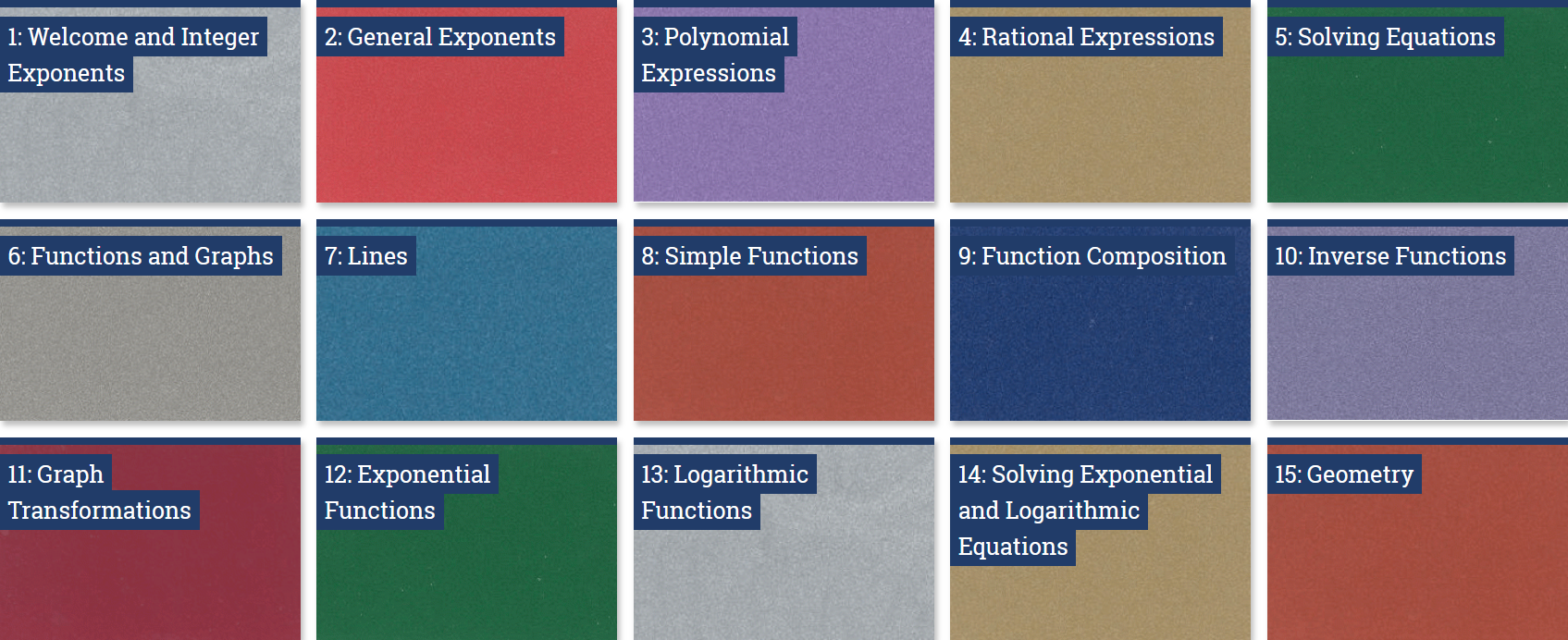
Primary researcher(s): Sharon Garthwaite, Kelly Bickel, Jeff Langford
Date: Ongoing
The Mathematics Department reached out to us with a proposal to replace ALEKS, the software used for calculus resources and prep for students going into Calculus I. The proposal submitted to us outlined the project and the principles in which should guide the creation of this new resource:
Most Bucknell students who take MATH 201: Calculus I need to review core algebra and precalculus content in order to be successful in calculus. Currently, students complete a 6-week precalculus review program through an external vendor named ALEKS, which costs Bucknell more than $15,000 per year. While this program is beneficial and significantly better than no review program at all, both student feedback and learning outcomes in MATH 201 indicate that there are some weaknesses in the current ALEKS program. However, Bucknell has a very limited ability to alter the content or structure of this external course. The Math Department Curriculum Committee has also investigated other externally-created precalculus review programs and has not found any program that would be an improvement over the ALEKS one.
Instead, to better prepare our students, the Bucknell Mathematics department would like to develop an in-house Prep for Calculus program (with assistance from L&IT) for students entering MATH 201: Calculus I. The yearly upkeep and administration costs for the proposed program would be about one third of the cost of the ALEKS course. The guiding principles of this program would be:
- Principle 1: The program should be easy for our students to use and align with our students’ current learning strategies and motivators.
- Principle 2: The program should closely align with the content and pedagogical practices that are used in Calculus I at Bucknell.
- Principle 3: The program should be able to be maintained from year-to-year without the need for constant overhaul and should be flexible enough to accommodate students who join Calculus I at the beginning of the semester or do not have the resources to complete the program over break.
- Principle 4: The program should include resources and problem sets that students can revisit throughout the semester to re-review and practice core background content.
We helped Mathematics faculty use a combination of Moodle, Kaltura/Mediaspace, the 2nd Floor Studio, and various technologies from the Equipment Desk to create a resource that would align with these principles and also meet the desired goals:
- The program will foster a sense of community and connection to Bucknell by introducing students to various Bucknell professors, directly referencing their future MATH 201 course,and advertising Bucknell quantitative support resources.
- The streamlined content will make the program friendlier and less time-intensive for students,while emphasizing the core ideas that they need for MATH 201.
- The use of high-quality video lectures coupled with extra practice problems matches the learning structures that our students report work best for them.
- The program’s resources will be available to students long term and thus, will provide students with quality precalculus resources that they can revisit throughout their calculus journey.
- The content will mirror the pedagogical approaches we use in MATH 201 and thus better prepare students for the type of instruction and assessments at Bucknell.
This work is ongoing and we are on track with the established timeline:
Summer 2024: Three content developers (either three math faculty or two math faculty and the quantitative support specialist) with assistance from an L&IT representative will create the program and associated website. Three additional consultants from the math department will provide assistance, input, and feedback.
Fall 2024: We will solicit feedback from key constituencies, including the math department and TLC, decide how best to integrate this program into MATH 201, hire student employees to work through it and give feedback, and make any needed changes.
Winter/Spring 2025: We will pilot the program for students entering MATH 201 in the spring.We will use student and instructor surveys (as well as a MATH 201 precalculus diagnostic) to obtain information about the effectiveness of this pilot program and determine what changes should be made before full implementation in Summer 2025.